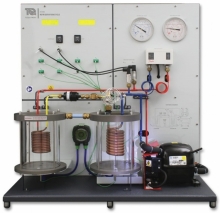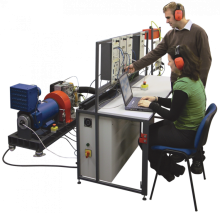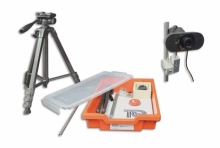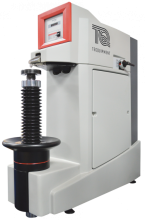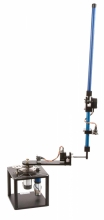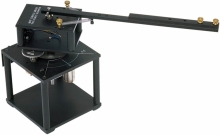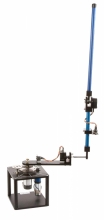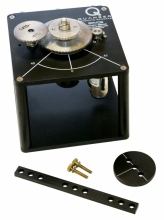Bench-top unit that allows students to investigate the stages of refrigeration.
The global standard in transformational engineering labs for Controls, Robotics, and Mechatronics, optimized for the academic setting.
Academic institutions trust Quanser to strengthen their reputation through transformative teaching and research labs that accurately replicate theories and bring engineering mathematics and concepts to life.
“We are in a golden age of engineering education. There’s a lot to be excited about and a lot to be challenged by. The education we offer students must capture this momentum and help them realize their potential.”
– Paul Gilbert, CEO, Quanser
The standard in controls teaching and research.
Modeling & controls lie at the core of emerging technological breakthroughs. From drones to reusable rockets to self-driving vehicles, the fundamentals of modeling & control are a critical skill for engineers to compete and innovate.
Process Control
The modern industrial systems that are fundamental to modern automation and manufacturing processes require specialized control systems to perform and manage their daily operations. Quanser offers a variety of plants that can be used to teach the key elements of modern process control including cascade control with the Maglev and Ball and Beam systems as well as regulator design with the Coupled Tanks.
Classic Systems Control
The classic progression of control systems education begins with the fundamentals of modeling and designing control plants for linear systems. Quanser offers a diverse collection of plants that can be used as ideal platforms to offer students experience using classic control principles. These plants offer basic dynamics that range from rotary to linear motion.
Modern Systems Control
Quanser has a collection of plants that can be used to show how a modern approach to control systems allows for the creation of precise controllers for complex systems with higher-order dynamics. These plants include both dynamically complex plants such as the linear inverted pendulum, and double pendulum, as well as plants such as the active suspension that require the use of both state-space modeling to express the complex coupled dynamics of the system.
Unstable Systems
Some of the most exciting emerging technologies from bipedal walking robots to reusable rockets requires the design of controllers for unstable systems. Quanser offers several plants that give students an experience creating control systems for directly analogous dynamic systems.
Whether you are researching advanced algorithms or require state of the art technology to teach tomorrow's robotics engineers, Quanser's engineering lab solutions has the perfect option for your needs.
Mobile Robotics
Many consider mobile robotics the most dynamic engineering specialization. Quanser’s ground and aerial solutions offer a combination of advanced hardware with a powerful software framework powered by Quanser’s renowned QUARC® and built on the MATLAB®/Simulink® platform. Quanser solutions feature the latest processors and flexible support of sensors. They may be combined to create a UVS Lab that offers full localization and a comprehensive platform for multi-agent applications.
Manipulator Robotics
The study and exploration of serial link robots has been a core component of robotics education and research. Originally, the study of manipulator robots was driven by applications in manufacturing, but later became an important subsystem in more complex robotic applications in both space robotics and mobile robotics.
Open Architecture Research Robots
Quanser's research solutions allow you to deploy your own advanced control algorithms by providing students and researchers direct access to the robot’s sensors and actuators. With the capabilities of the communication block sets of Quanser’s QUARC software validating your robotic control algorithms is easier than ever.
Telerobotics and Haptics
This solution is the platform of choice for advanced telerobotic applications with haptic feedback. It consists of an advanced robot manipulator equipped with a force/torque sensor mated a high DOF haptic manipulator and Quanser’s QUARC real-time control software. This turn-key solution can be deployed quickly and is readily adaptable for a wide range of force-feedback research applications. Combined with visualization, it is the ideal platform for medical simulations, remote vehicle operations, and more.
Essential sequence for undergrad mechatronics
Quanser offers the only complete Mechatronics lab sequence that covers everything from fundamentals to fully integrated systems.
With Quanser’s mechatronic solutions, instructors can focus on teaching fundamentals of the mechatronics subsystems and advanced applications with fully developed robust hardware powered by rigorous software.
Traditionally, developing a fully functional mechatronic system requires expertise in actuation, sensing, control, and vision, along with time developing hardware and software. This development process, although rigorous, can interfere with understanding fundamentals, and takes away precious time that can be otherwise dedicated to innovation. With Quanser’s mechatronic lab equipment, instructors can focus on teaching fundamentals of the mechatronic subsystems and advanced applications with fully developed robust hardware powered by rigorous software.
Built exclusively for the NI ELVIS platform, the Mechatronics top boards series includes:
- Sensors: survey of common mechatronic sensors used in industry
- Actuators: design considerations, common specifications, interfacing and operation techniques for a variety of actuators
- Systems: a complete mechatronic system designed to explore, develop and integrate component subsystems
Integrated Systems
Quanser has a variety of products for teaching system integration. The Quanser Mechatronic Systems board is the flagship systems trainer with hardware, software, and courseware developed specifically to teach mechatronic systems integration. From actuators and FPGA sensor integration, through mathematical modeling and image processing, to state machines and advanced applications, the Quanser Mechatronic Systems board offers a rich experience for students.
The QUBE-Servo 2 and Quanser AERO also offer students a series of advanced mechatronic challenges that lead them towards more advanced integration tasks including flight control of a virtual V22 Osprey, and cruise control of a virtual vehicle. Further opportunities to extend the topics covered by all of the Quanser products open up a variety of pathways for instructors to educate, and students to innovate, no matter what be the engineering background.
Pages
-
Item Number:EC1500 - Experiment
-
Item Number:TD300 - Experiment
A versatile engine test bed with instrumentation to provide the facilities to investigate the operating characteristics of compatible and interchangeable single-cylinder internal combustion engines rated up to 10 kW.
-
Item Number:RVH1, RVH2, RVH3, RVH3+
The Remote View Hardware offering from TecQuipment is a bundle containing two cameras, tripods, stands, and mounts for live streaming of experiments and demonstrations in the lab.
-
Item Number:SM1015 - Experiment
A bench-top industrial-standard tester for accurate measurements of Rockwell hardness.
-
The Rotary Double Inverted Pendulum module is ideal to introduce intermediate and advanced control concepts, taking the classic single inverted pendulum challenge to the next level of complexity. You can use it to demonstrate real-world control challenges related, for example, to takeoff stabilization of a multi-stage rocket. The Rotary Double Inverted Pendulum module attaches to the Rotary Servo Base Unit.
-
The Rotary Flexible Joint module is ideal for modeling a flexible joint on a robot when mounted on the Rotary Servo Base Unit. It is also useful in the study of vibration analysis and resonance. This experiment uses a sensor to measure joint deflection, to address the control problems encountered in large, geared robot joints where flexibility is exhibited in the gearbox. Students will learn how to model the system using state-space and design a feedback controller with pole-placement.
-
The Rotary Flexible Link module is designed to help students perform flexible link control experiments. The module is designed to be mounted on the Rotary Servo Base Unit. This experiment is ideal for the study of vibration analysis and resonance and allows us to mimic real-life control problems encountered in large, lightweight structures that exhibit flexibilities and require feedback control for improved performance. The experiment is also useful when modeling a flexible link on a robot or spacecraft.
-
The Rotary Double Inverted Pendulum module is ideal to introduce intermediate and advanced control concepts, taking the classic single inverted pendulum challenge to the next level of complexity. You can use it to demonstrate real-world control challenges related, for example, to takeoff stabilization of a multi-stage rocket. The Rotary Double Inverted Pendulum module attaches to the Rotary Servo Base Unit.
-
The Rotary Servo Base Unit is the fundamental element of the Quanser Rotary Control experiments. It is ideally suited to introduce basic control concepts and theories on an easy-to-use and intuitive platform. Use it on its own to perform several experiments, or expand the scope of this unit by adding on other modules to teach an even wider range of control concepts.
-
Item Number:SM1090V - Experiment
Demonstrates the failure of materials when subjected to an alternating stress.

